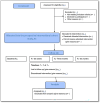Evaluation of the Friendship Bench' Circle Kubatana Tose (CKT): an add-on support group intervention - a mixed-methods pilot interventional cohort study protocol
- PMID: 39038863
- PMCID: PMC11268037
- DOI: 10.1136/bmjopen-2023-079842
Evaluation of the Friendship Bench' Circle Kubatana Tose (CKT): an add-on support group intervention - a mixed-methods pilot interventional cohort study protocol
Abstract
Introduction: Mental disorders are endemic. However, the mental health treatment gap remains high, especially in low-resource settings. Task-shifting is a universally recommended strategy to mitigate the care gap. The Friendship Bench (FB), a task-shifting, low-intensity psychotherapy programme founded in Zimbabwe, is effective in managing anxiety and depression. The FB programme offers clients the choice of joining add-on mental health support groups known as Circle Kubatana Tose (CKT). These groups offer an opportunity for continued psychoeducation, social support and economic strengthening. However, the evidence base for the effectiveness of add-on support groups is sparse. We hypothesise that participation in CKT is associated with increased adherence to treatment regimens, social support and well-being. This mixed-methods prospective cohort study seeks to evaluate the intermediate effects (6-month follow-up) of CKT groups, including process outcome evaluation.
Methods and analysis: We will recruit participants (N=178) receiving mental healthcare from the FB in Harare primary care clinics. Follow-up assessments will occur at enrolment, 6 weeks, 3 months and 6 months, assessing changes in common mental disorders (depression and anxiety), social support, positive psychological indices (hope and resilience), health-related quality of life, working alliance, economic outcomes (net income) and implementation outcome (feasibility, acceptability/satisfaction and uptake of services). Quantitative data will be analysed using descriptive analysis, bivariate statistics, Cox proportional hazard models and generalised mixed models (maximum likelihood estimation). Qualitative data will be analysed using thematic analysis.
Dissemination and ethics: Ethical approval was granted by the Medical Research Council of Zimbabwe (MRCZ/A/2427). The findings will inform the potential utility of add-on support groups in the management of anxiety and depression using task-shifting. Dissemination study outcomes will be disseminated in academic journals, social media, conferences and policy briefs.
Keywords: Adult psychiatry; Anxiety disorders; Depression & mood disorders; MENTAL HEALTH.
© Author(s) (or their employer(s)) 2024. Re-use permitted under CC BY-NC. No commercial re-use. See rights and permissions. Published by BMJ.
Conflict of interest statement
Competing interests: None declared.
Figures
Similar articles
-
Effect of a Primary Care-Based Psychological Intervention on Symptoms of Common Mental Disorders in Zimbabwe: A Randomized Clinical Trial.JAMA. 2016 Dec 27;316(24):2618-2626. doi: 10.1001/jama.2016.19102. JAMA. 2016. PMID: 28027368 Clinical Trial.
-
Optimising implementation strategies of the first scaleup of a primary care psychological intervention for common mental disorders in Sub-Saharan Africa: a mixed methods study protocol for the optimised Friendship Bench (OptFB).BMJ Open. 2021 Sep 13;11(9):e045481. doi: 10.1136/bmjopen-2020-045481. BMJ Open. 2021. PMID: 34518246 Free PMC article.
-
A Digital Mental Health Intervention (Inuka) for Common Mental Health Disorders in Zimbabwean Adults in Response to the COVID-19 Pandemic: Feasibility and Acceptability Pilot Study.JMIR Ment Health. 2022 Oct 7;9(10):e37968. doi: 10.2196/37968. JMIR Ment Health. 2022. PMID: 35960595 Free PMC article.
-
Behavioural modification interventions for medically unexplained symptoms in primary care: systematic reviews and economic evaluation.Health Technol Assess. 2020 Sep;24(46):1-490. doi: 10.3310/hta24460. Health Technol Assess. 2020. PMID: 32975190 Free PMC article.
-
Development and evaluation of a de-escalation training intervention in adult acute and forensic units: the EDITION systematic review and feasibility trial.Health Technol Assess. 2024 Jan;28(3):1-120. doi: 10.3310/FGGW6874. Health Technol Assess. 2024. PMID: 38343036 Free PMC article.
References
Publication types
MeSH terms
LinkOut - more resources
Full Text Sources
Miscellaneous

